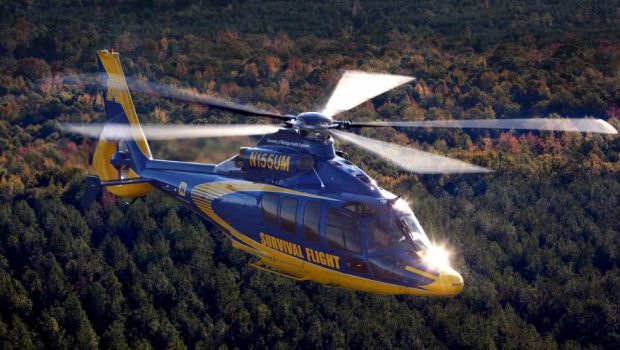Metro Embraces Camera, Training Technology
Metro Aviation, continuing to broaden its use of new and advanced technologies, is winding down the test phase of a base weather camera trial at the University of Michigan Children’s Hospital in Ann Arbor. The helicopter ambulance services provider, which is running the Michigan weather camera program in cooperation with the FAA, began the trial in August.
When placed into regular operation, Brian Bihler, director of operations for Metro (Booth 7736), said the cameras, which cost just under $10,000, will more than pay for themselves.
The company's base at the Ann Arbor hospital is 4.2 nm from the nearest airport’s automated surface observing system (ASOS) and the hospital does not have its own weather reporting station. The nearest airport is located in a valley, and its ASOS reports often vary greatly from the actual weather at the helicopter air ambulance, causing missions to be unnecessarily scrapped. “Sometimes they’re fogged in and we’re high VFR,” said Brian Bihler, Metro's director of operations.
Bihler estimates the Ann Arbor base could pick up an additional 16 missions per year or more by relying on weather observations from the camera. Metro bought the equipment through the FAA., which has had a long-established weather camera program in Alaska and has recently expanded it to Colorado.
Bihler sees other areas in the U.S. where weather cameras could also have a positive impact, including the mountainous areas of North Carolina. While current program rules do not allow pilots to access weather camera images and data directly from the cockpit, that could change over time, according to Bihler, adding that Metro could potentially offer weather cameras to its 38 programs at more than 140 bases in the U.S.
The Icarus device allows instructors to gradually change the opacity of the helmet-mounted visor, using a smartphone app, to allow students to practice entry into instrument meteorologial conditions safely and effectively.
“Everybody is kind of watching it to see exactly what kind of data we're going to get from it [the camera],” Bihler said. “We really hope that this takes off and that the FAA sees the value in it. There are a lot of people who can access that camera. Air traffic control in Ann Arbor can look at it and our operational control center here [in Shreveport] can also look at it. It’s live data.”
Training is another area where Metro is investing; the company recently purchased 60 Icarus (Instrument Conditions Awareness Recognition and Understanding System) devices to help improve its pilots’ instrument flying proficiency and to train for inadvertent entry into Instrument Meteorological Conditions (IMC).
Metro is in the process of distributing the devices to its bases.
“We did a trial run out in the field with a certain program and the feedback was phenomenal, the value of the training was unbelievable,” Bihler remarked. “We were relying heavily on our simulators here in Shreveport, but our pilots only come back here maybe once or twice a year. With these devices, you can replicate IFR conditions without being in the simulator. From our perspective, that’s huge. When our crews are down—and there’s a lot of waiting around in the air medical business—they can be practicing their IFR proficiency in the aircraft and still be ready to go on a mission at a moment’s notice.”








Gloss